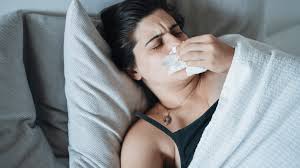Allergies occur when the body’s immune system overreacts to harmless substances like pollen or pet dander. They commonly have long-term effects on both physical health and sleep quality.
These impacts are not just a nuisance, as they often have a drastic effect on energy levels, mood, and overall well-being. Understanding the triggers behind allergies and exploring solutions, such as allergy shots, can be key in managing their effects.
Why Do Allergies Happen?
Allergies occur when the immune system identifies a harmless substance, known as an allergen, as a threat. This response triggers the release of histamines, which cause allergy symptoms such as sneezing, congestion, watery eyes, and itching. Common airborne allergens include pollen, mold spores, and dust mites.
The severity of allergies often varies depending on genetic predisposition and environmental factors. For some, mild symptoms are manageable, but for others, frequent exposure to allergens may lead to chronic issues, particularly at night.
While over-the-counter and prescription medications like antihistamines or decongestants may temporarily relieve symptoms, allergy shots offer a more long-term solution. Allergy shots work by gradually desensitizing the immune system to specific allergens. This reduces the severity of symptoms over time, resulting in improved daily functioning and more restful sleep.
How Do Allergies Impact Your Sleep and Overall Health?
Persistent allergies often create a cycle that negatively affects sleep and overall health. Many allergens are airborne and microscopic, making exposure nearly impossible to avoid entirely. Pollen levels are commonly higher in the morning and evening, and poor indoor ventilation can increase exposure to dust mites or mold spores.
Indoors, allergens in bedding, carpets, and upholstery may cause respiratory irritation. Prolonged exposure to these triggers in the evenings and throughout the night can lead to interrupted sleep cycles.
Nasal congestion caused by allergens often builds up in the sinuses throughout the day, making it harder to breathe in the evenings, disrupting sleep. This congestion may lead to snoring or even conditions like sleep apnea, further reducing sleep quality and energy levels.
Simple lifestyle changes, like taking a shower before bed, can remove allergens from skin and hair. This helps prevent them from transferring to bedding or into the air. Pairing this with medications or long-term solutions, like allergy shots, can significantly alleviate nighttime symptoms, helping individuals achieve deep, uninterrupted sleep.
What Medications Can Help?
Managing allergies often begins with medications designed to target specific symptoms. Antihistamines, for instance, block histamines, reducing sneezing and itching. Nasal sprays can alleviate congestion by directly clearing the nasal passages. For those suffering persistent symptoms, prescription solutions may address underlying inflammation.
Immunotherapy solutions provide a more comprehensive approach, targeting the immune response itself. Immunotherapy through allergy shots is a game-changer for many allergy sufferers, particularly those affected by airborne allergens. The allergens these shots can help with include:
- Pollen (from trees, grasses, and ragweed)
- Cockroaches
- Dust Mites
- Mold Spores
- Animal Dander
The allergy shot method reduces the dependency on daily medications over time, delivering sustained relief. Through consistent administration, allergy shots train the immune system to tolerate these allergens, resulting in fewer and less severe allergic reactions. These benefits often include improved sleep and an enhanced quality of life, making them a fundamental treatment for individuals affected by chronic allergies.
Find Out If Allergy Shots Can Benefit You Today
The effects of allergies on sleep and health can become challenging, but they do not have to dominate your life. With solutions like allergy shots, it is possible to significantly reduce symptoms, sleep better, and regain control over your daily and nightly routines.
Speak to a healthcare professional to learn how allergy shots could be the key to experiencing fewer symptoms and better health. Your path to relief begins today.
Related Articles
The Connection Between Bunions and Joint Pain in Your Feet
What You Need To Know About Varithena for Treating Varicose Veins
When To Seek Professional Help for Persistent Back Pain
Differences Between a Pediatric Root Canal and an Adult Root Canal





